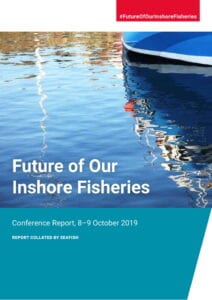

The next steps for the ambitious and collaborative, project which aims to improve how the UK’s inshore fisheries are managed have been published.

The Future of Our Inshore Fisheries steering group, of which the Company is a member, has released both a report, detailing discussions from last year’s two-day conference and an action plan, which sets out the first stage of practical actions to reform the management of UK inshore fisheries. At the heart of the project is the desire to establish an effective inshore fisheries management system that can deliver a viable and profitable inshore fishing industry that supports flourishing coastal communities.
The two-day Future of Our Inshore Fisheries conference, which took place in October 2019, brought almost 180 representatives together to discuss the challenges faced by UK inshore fishermen. Participants included sixty active fishermen together with industry leaders, policy makers, regulators, researchers and representatives from environmental groups. Conference attendees heard examples of fisheries management solutions and best practice from around the world and considered their relevance to the UK’s inshore fisheries. Seen as the first milestone in the delivery of the project, the conference set out to ensure that the vital expertise and experience of active inshore fishermen set the priorities for the project’s next phase and inform its upcoming work.
The Future of Our Inshore Fisheries conference report details the conference presentations, the findings from group discussion sessions and the results of live polling. While the report does not make specific recommendations, it does outline the key themes which emerged and captures the priority areas identified by participants. The report concludes by recognising that the scale of change which is wanted and needed is significant, and that developing and implementing solutions will take time.
Based on the report’s findings, the steering group has identified five themes that will shape future work: co-management; collaborative science; credible fisheries management; rights and access; and effective compliance. The action plan is the first attempt to set out clear, deliverable actions across these themes that will be progressed over the next 12 – 18 months.
Steering group member Barrie Deas, Chief Executive of the National Federation of Fishermen’s Organisation said:
The conference report is rich in energy, information and insight, informed by the participation of active fishermen. But it is of course not an end in itself; I doubt that we would have seen the engagement from fishermen across the country if our ambition was limited to producing a report.
I particularly welcome the publication of the action plan. Importantly, it builds on the conference outcomes and takes into account the priorities that conference attendees set.
We should be ambitious in wanting a fisheries management system that is truly sustainable, and which not only meets our environmental objectives but is also capable of meeting our social and economic needs at a national, regional and local level.”